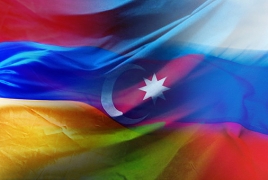The Hill: Russia loses grasp on Caucasus amid regional shifts July 10, 2025 - 11:52 AMT PanARMENIAN.Net - The Hill has recently published an article examining Russia’s waning influence in the South Caucasus and the shifting dynamics between Armenia, Azerbaijan, and the West. The article says that “Russia has held sway over the South Caucasus for more than 150 years, exerting control through exploitation, authoritarianism and a colonial ‘divide-and-rule’ approach. Moscow’s most recent strategic pressure point centered on the dispute over Karabakh—the separatist enclave backed by Armenia—with Russia simultaneously instigating and mediating the conflict.” It goes on to note that “Today, Armenia and Azerbaijan are laying out firm boundaries, and the U.S. is presented with a historic chance to offer assistance.” According to the article, “Relations between Russia and Azerbaijan have deteriorated after allegations that Russian police tortured two Azerbaijani citizens to death during a broader crackdown on ethnic Azerbaijanis in Yekaterinburg. Azerbaijani officials described the murders as ‘ethnically motivated,’ and the circumstances suggest they likely were.” The Hill reports that, “In retaliation, Azerbaijan detained the chief and managing editors of the Russian state news outlet Sputnik, accusing them of ties to Russian intelligence. Authorities also arrested eight additional Russian nationals on drug trafficking and cybercrime charges.” The article continues: “This escalation follows tensions dating to December, when Russia shot down an Azerbaijani passenger plane, killing 38 people. Azerbaijani President Ilham Aliyev demanded a public apology and compensation, but Moscow initially ignored him. This triggered a cascade of reprisals, including the closure of Russian media and cultural centers in Azerbaijan and a major cyberattack targeting Azerbaijani state media.” Turning to Armenia, the article reads: “Meanwhile, Armenia has also been distancing itself from Russia. Just before the killings of the two Azerbaijanis, Yerevan skipped a session of the Russian-led Collective Security Treaty Organization and revealed plans to explore defence cooperation with the European Union. Though Armenia remains economically and militarily tied to Russia, it has steadily diversified its foreign relations—building ties with Iran, India and others.” The Hill notes that “Such overt defiance from both Armenia and Azerbaijan would have been unthinkable five years ago. Two pivotal events have helped break Russia’s dominance in the South Caucasus: Azerbaijan’s recapture of Karabakh and Russia’s war in Ukraine.” It explains that “For nearly three decades, Russia leveraged the Karabakh conflict to keep Armenia and Azerbaijan in check. It employed a similar separatist-strategy in Ukraine, Moldova and Georgia. However, when Azerbaijan regained Karabakh in 2020 and 2023, Moscow lost its most effective leverage.” The article also states: “As Russia became deeply embroiled in Ukraine, its ability to influence Armenia and Azerbaijan weakened significantly.” According to The Hill, “By pitting Armenia against Azerbaijan, Russia fostered resentment in both. Paradoxically, this may now be bringing the two countries closer together.” It cites Middle East Eye, which reported that “Armenian Prime Minister Nikol Pashinyan and Azerbaijani President Aliyev are expected to meet in UAE to advance peace talks.” The article suggests that “As developments unfold, the U.S. should cautiously support both nations in ways that reinforce America as a non‑bullying ally—unlike Russia.” It proposes two U.S. initiatives: “First, the U.S. should support Pashinyan’s ‘Crossroads for Peace’ strategy, which aims to connect Armenia to the Middle Corridor through infrastructure, economic integration and peacemaking with Azerbaijan and Turkey. U.S. backing would help extend this trade route for Asian goods to Europe, bypassing Russian and Iranian transit and reducing Armenia’s reliance on Moscow.” “Second, Washington could explore joint defence cooperation with Azerbaijan and Israel—a proposal put forth by Israeli officials and Prime Minister Benjamin Netanyahu. The goal wouldn’t be to deter Russia, which is unlikely to attack Azerbaijan, but to counter Iran’s more unpredictable influence. Iranian officials and media have accused Baku of aiding Israel’s ‘Operation Rising Lion’ by recruiting ethnic Azerbaijanis as spies and permitting Israeli operations from its territory.” The Hill emphasizes that “Supporting Armenia is equally critical. As long‑time analyst Onnik Krikorian has warned, the country is ‘close to the brink.’ Pashinyan faces challenges from pro‑Russian church figures and politicians he alleges are plotting a coup. Armenia’s dependence on Moscow for energy—importing 83 percent of its gas and 80 percent of its oil—remains a significant weakness.” The article concludes by asserting that “Moscow’s diminishing grip presents an opening—not for new hegemonic ambitions, but for partnerships rooted in respect for regional sovereignty.” The piece is authored by Joseph Epstein, director of the Turan Research Center at the Yorktown Institute. The foreign ministers of Armenia and Azerbaijan, Ararat Mirzoyan and Jeyhun Bayramov, have arrived in Washington. The CSTO budget for the current year requires adjustments due to the refusal of Yerevan to pay their share of contributions. Six total incidents have burned 19 old-growth trees. Friday night 8 trees were torched along the beautiful main entrance. The EU does not intend to conduct military exercises with Armenia, Lead Spokesperson for EU Foreign Affairs and Security Policy Peter Stano says. Partner news |